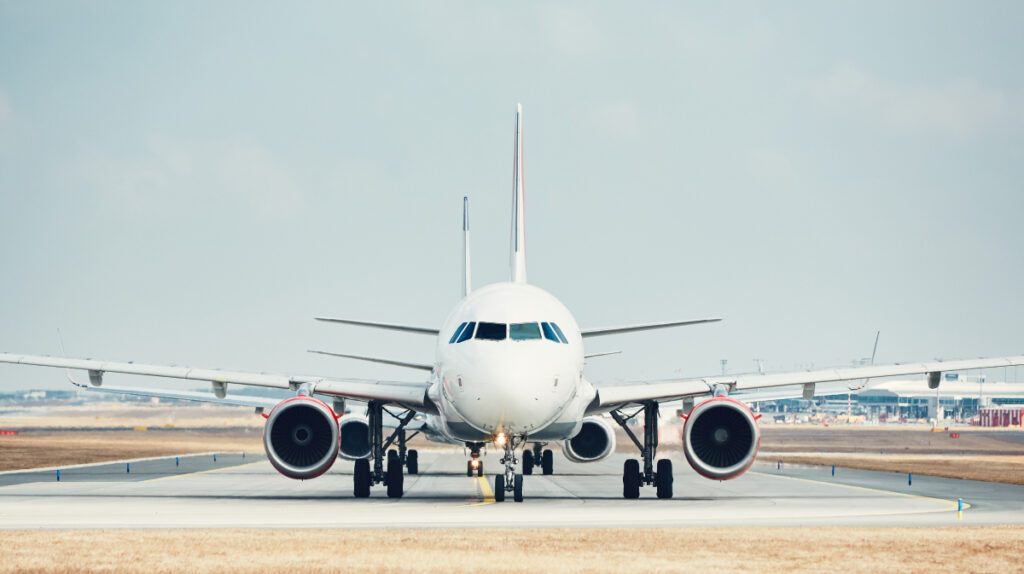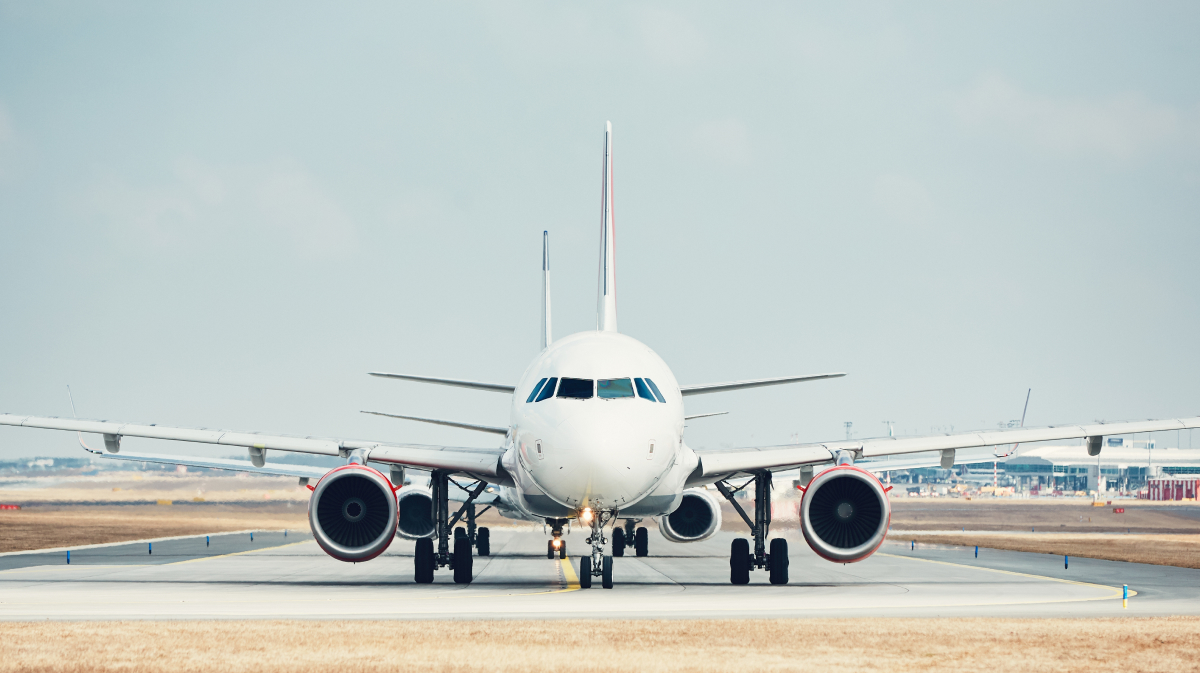
The air travel industry is currently undergoing a period of significant transformation. In the aftermath of the pandemic, the industry experienced a severe downturn with reduced passenger demand, grounded fleets, and financial challenges for airlines worldwide.
While the gradual resumption of the future of air travel has led to some recovery, the landscape remains complex, characterized by shifting consumer behaviors, fluctuating travel restrictions, and ongoing concerns about health and safety. Airlines are grappling with the need to rebuild consumer confidence, adapt to new travel norms, and confront operational challenges, making it a pivotal moment for the industry to redefine its trajectory.
Being well-informed about industry-shaping aviation industry trends positions organizations to navigate regulatory changes, implement sustainable practices, and enhance the overall travel experience.
This blog explores 5 industry-shaping trends defining the future of air travel.
Trend 1: Sustainable Aviation
The environmental impact of aviation has become a critical concern as the industry grapples with its carbon footprint and other ecological repercussions. Traditional aircraft emit greenhouse gases, such as carbon dioxide and nitrogen oxides, contributing to climate change and air pollution. The growing air travel volume exacerbates these issues, prompting a heightened focus on developing sustainable practices to mitigate the environmental impact.
In response to environmental concerns, sustainable aviation practices and technologies have emerged as the future of air travel. These practices encompass a wide range of initiatives, including fuel efficiency improvements, aircraft design enhancements, and the integration of alternative fuels. Airlines are investing in modernizing fleets with more fuel-efficient aircraft, optimizing operational procedures, and implementing sustainable practices in ground operations.
Additionally, the development of alternative aviation fuels, such as biofuels, presents a promising avenue for reducing the carbon footprint of air travel. Sustainable aviation practices not only align with environmental goals but also have the potential to yield cost savings and operational efficiencies for airlines.
Trend 2: Virtual Reality
VR technology is a powerful tool and the future of air travel, providing immersive and interactive experiences that extend beyond the limitations of traditional approaches. One of the primary applications of VR in the air travel sector is in the realm of training. For pilots,
VR enables realistic simulations of various flight scenarios. It offers a dynamic and controlled environment for honing skills and responding to emergencies. The technology also benefits cabin crew training. It facilitates immersive simulations of emergency procedures and enhances interpersonal skills for improved customer service.
Moreover, VR plays a pivotal role in revolutionizing the maintenance aspects of air travel. For aircraft maintenance training, VR offers an invaluable virtual inspection platform for complex components, interactive maintenance procedures, and troubleshooting simulations. Technical crews can engage with realistic scenarios in a virtual space, enhancing their proficiency in handling various maintenance challenges.
Additionally, VR finds application in the engineering and design phases, allowing for virtual prototyping of aircraft designs. It also enables collaborative reviews in a simulated environment. By identifying potential issues in the virtual realm, VR expedites the design process and streamlines maintenance procedures.
Trend 3: Personalized and Seamless Customer Experiences
Airlines now recognize passengers as more than just travelers. They see them as customers with unique preferences and expectations. This recognition has become a strategic imperative. A customer-centric approach involves tailoring services, interactions, and experiences to meet the individual needs and desires of passengers.
As the industry evolves, airlines realize that delivering exceptional customer experiences is essential. It is not just a differentiator but also a key driver of loyalty, repeat business, and positive word-of-mouth.
Data-driven personalization has emerged as a powerful tool for enhancing customer experiences in air travel. Airlines leverage passenger data, including travel history, preferences, and behavior, to offer personalized services and recommendations.
Data analytics enables airlines to create tailored experiences that resonate with individual passengers, seat preferences, and in-flight entertainment choices.
Artificial intelligence and machine learning further refine these personalization efforts, allowing aviation industry trends to anticipate passenger needs and enhance travel experience. This level of customization not only delights passengers but also contributes to increased customer satisfaction and loyalty.
Trend 4: Advanced Technology Integration
Technology has become a cornerstone of the air travel industry, revolutionizing efficiency and safety. Advancements in navigation systems, communication protocols, and aircraft design have collectively contributed to safer and more streamlined air travel experiences.
Improved radar systems, sophisticated weather forecasting tools, and enhanced communication networks have significantly bolstered air travel safety. Technology plays a pivotal role in optimizing operational efficiency. It helps in route planning and air traffic management to maintenance and passenger service.
The landscape of air travel is continually shaped by aviation industry trends. Among the most impactful are artificial intelligence (AI), the Internet of Things (IoT), and blockchain. AI is transforming various aspects of aviation, from predictive maintenance to flight optimization and customer service through chatbots and personalized experiences.
The IoT enables a network of interconnected devices and sensors, enhancing real-time data collection for improved decision-making, passenger services, and aircraft maintenance. Blockchain technology revolutionizes transparency and security in baggage tracking, identity verification, and supply chain management. The exploration of these technologies underscores a shift towards a more interconnected, intelligent, and data-driven air travel ecosystem.
Trend 5: Contactless Travel Experiences
Key components of the contactless travel experience include biometric authentication, mobile apps, and digital passports. Biometric technologies, such as facial recognition and fingerprint scanning, provide secure and efficient means of verifying passenger identities at various touchpoints—check-in, security, and boarding.
Mobile apps have become indispensable passenger tools, enabling contactless check-in, boarding pass retrieval, and even in-flight services. Digital passports, integrated with secure blockchain technology, offer a streamlined and secure way to manage passenger identities and travel documentation. The future of air travel with these technologies enhances the efficiency of travel processes and contributes to a seamless and frictionless passenger experience.
Using biometric authentication and digital documentation streamlines the entire travel journey, allowing minimal interruptions. On the other hand, airlines benefit from improved operational efficiency, reduced boarding times, and lower operational costs.
Final Thoughts
Stay compliant with your organization’s travel policies and effortlessly keep up with the new aviation industry trends. Our corporate travel management software ensures your travel program aligns with sustainability goals and regulatory requirements. From setting green travel policies to monitoring adherence, our solution streamlines the compliance process, keeping pace with the future of air travel.
To know more about the benefits, book a free demo today!













